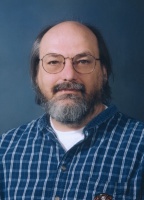
Entrisphere, Inc
«Reflections on Trusting Trust»[Abstract] 10.99Kb (0) 8838 hitsKenneth Thompson (born February 4, 1943) is a pioneer of computer science notable for his contributions to the development of the C programming language and the UNIX operating system. Within the computer communities, Thompson is often referred to simply by his first name Ken. Thompson is credited, along with Dennis Ritchie, with the creation of C—as of 2006, the world's most used programming language.
Thompson was born in New Orleans, Louisiana, USA. He received a Bachelor of Science in 1965 and Master's degree in 1966, both in Electrical Engineering and Computer Science, from the University of California, Berkeley, where his Master's thesis advisor was Elwyn Berlekamp.
In the 1960s, Thompson and Dennis Ritchie worked on the Multics operating system. While writing Multics, Thompson created the Bon programming language. The two left the Multics project as it was becoming too complex, but they took the lessons they learned to Bell Labs, where, in 1969, Thompson and Ritchie were the principal creators of the UNIX operating system. There, Thompson also wrote the B programming language, a precursor to Ritchie's C.
Thompson had developed the CTSS version of the editor QED, which included regular expressions for searching text. QED and Thompson's later editor ed (the default editor on Unix) contributed greatly to the eventual popularity of regular expressions, previously regarded mostly as a tool (or toy) for logicians. Regular expressions became pervasive in Unix text processing programs (such as grep). Almost all programs that work with regular expressions today use some variant of Thompson's notation for them.
Along with Joseph Condon, he created the hardware and software for Belle, a chess computer. He also wrote programs for generating the complete enumeration of chess endings, for all 4, 5, and currently 6-piece endings. Using these so called tablebases, a chess-playing computer program can play perfectly once a position stored in them is reached.
Thompson's style of programming has influenced others, notably in the terseness of his expressions and a preference for clear statements.
In late 2000, Thompson retired from Bell Labs, and is currently a fellow at Entrisphere, Inc.
Homepage http://www.cs.bell-labs.com/who/ken/